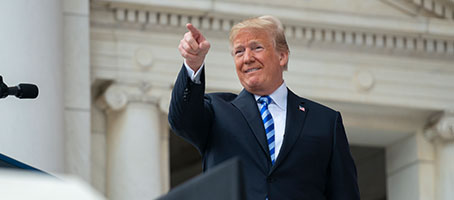
Fake news or an incorruptible algorithm? For Donald Trump, it’s clear: Google influences and controls people’s opinions by increasingly displaying results that don’t flatter the president. For example, his image is ranked first if you’re looking for “idiot”; his speech on the state of the nation is kept secret by Google, and critical media reports are always at the top of the ranking. It’s unacceptable for this company to display opinions other than those of the most powerful man in the world.
How this works is explained quickly: The search engine presents results that seem most attractive to the users. This is measured by which results are accessed most frequently, linked most frequently and awarded the highest reputation. However, this doesn’t say anything about the truth of the respective content, because Google doesn’t (can’t) measure whether users agree with the content and search results or not. The algorithm is thus a kind of mirror of society; it reflects the content and opinions currently most in demand. What is done with it is left to each user – including Donald Trump?
The thin line between fake news and algorithms causes a lot of confusion and uncertainty – as an SEO agency with years of experience DeSight Studio assures: Nobody will be disadvantaged!
The individual digital fate of the US president may thus have been clarified. But what does the Google algorithm do for users, companies, agencies, and online experts (like DeSight Studio) in the rest of the world? It is therefore essential to know precisely what an “algorithm” is, i.e., an unambiguous rule of action consisting of a finite number of steps to solve a problem. An algorithm, for example, is a process in which mathematical formulas convert certain variables (e.g., database entries) into other variables (e.g., sorting). For search engines, this means (simplified) that web content is brought into a specific order by the connection with search queries and displayed to the user.
We have summarized the most important facts about Google’s search algorithm for you:
Word analysis
The meaning of a word is not always 100% clear, because a word can have different meanings (funny can mean “funny,” but also “strange”). The word analysis gives the search query a specific direction.
Comparison of the search term
Now the web contents are compared with the search term, e.g., how often this keyword appears in the index, in headings, and the running text.
Page ranking
In most cases, there are still millions of pages that contain the search term. The algorithms now select according to the frequency of the search term, its topicality, user-friendliness, trustworthiness, external links to the page (…) and finally according to how often users clicked on the result because it seemed most suitable to them.
Context reference
The own location, the search history, the used language as well as the search preferences refine the preselection of the search results. For example, it makes a difference whether you are looking for “Football” in Germany or the USA.
Search results
After passing through all algorithm-based filters, the search results are displayed. As the Internet is continuously evolving, Google is continually working on the further development of its algorithms.
For Donald Trump, the train has probably left. His name is so often associated with other terms that Google’s search results inevitably appear in an unflattering order. However, the search results for the same search term could look different tomorrow. It is therefore particularly important for companies (which are somewhat more discreet in their public relations) to continually analyze their web presence and adapt it if necessary. Because if all factors fit, the own goals and Googles opinion can be brought quite in line.



